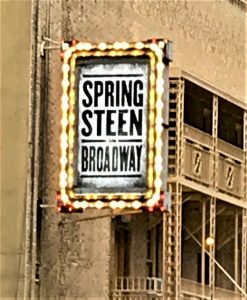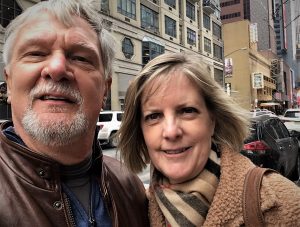Lessons of New York
 New York City is a magical place for bewitch-able people. I’m not one of them. My wife is, however, and the lure of the Great White Way, the Rockefeller Center Christmas tree, shopping, and knifing through its impenetrable social medium is her forte. It makes her happy. So, she was elated when she got tickets to see Springsteen on Broadway; she had bragging rights for a month. I too was excited within the confines of my dread of crowds, of New York crowds, and my seasonal mood constraints. These constraints start on my birthday in early November, build slowly to fill the void of waning sunlight, then amplify within the confines of indoors spaces, and are in full career by the winter solstice. As I pick through old family photos and write my Christmas cards, I become reflective, introspective and socially inert. Thus, New York City in December can be a challenge, but my wife’s happiness is overriding.
New York City is a magical place for bewitch-able people. I’m not one of them. My wife is, however, and the lure of the Great White Way, the Rockefeller Center Christmas tree, shopping, and knifing through its impenetrable social medium is her forte. It makes her happy. So, she was elated when she got tickets to see Springsteen on Broadway; she had bragging rights for a month. I too was excited within the confines of my dread of crowds, of New York crowds, and my seasonal mood constraints. These constraints start on my birthday in early November, build slowly to fill the void of waning sunlight, then amplify within the confines of indoors spaces, and are in full career by the winter solstice. As I pick through old family photos and write my Christmas cards, I become reflective, introspective and socially inert. Thus, New York City in December can be a challenge, but my wife’s happiness is overriding.
Anyway, it was a good trip. Yes, I still think of New York City as a massive rats-in-a-box psychology lab 101 experiment gone wrong, but the good outweighed the bad. Amid what ethologist, John B. Calhoun, called a “behavioral sink” I found enjoyment.
Springsteen was great. And, I mean that in a wow-he’s-a-world-class-performer-with-musical-and-poetic-chops-that-we, as-a-culture, should-all-be-proud-of kind of way. His two-hour musical narrative held my interest, made me rock in my seat, and made me plumb the depth of my moral and philosophical underpinnings. Death, sex, and rock-and-roll are the new catch-phrase for aging boomers. His lessons, from my mental notes, were: We are all flawed, we run away only to come home, and we all die but don’t give up hope.
The next morning, with Bruce still in our heads, we taxied to the American Museum of Natural History and saw Dark Universe at the Hayden Planetarium. There, the lesson we gleaned from the 
I’ll let the reader draw any master conclusion from these two big-stage events. But wait, there’s more. New York wasn’t finished filling our heads with contemplatable goodies.
On Amtrak 71 back to D.C. the venerable New York Times tells me that “In the $600 billion annual Defense Department budgets, the $22 million spent on the Advanced Aerospace Threat Identification Program was almost impossible to find.” The article, well worth a read, is about funding a military UFO identification program. A freshly released Pentagon video of two U.S. fighter jocks tracking an unidentified object was embedded in the article. So, questions multiply. Are we alone in the universe? Can we be found if we aren’t? Do we want to be found, really? What are the protocols if we are found or, for that matter, what should we do if we find someone else?
Back home in Alexandria after a decent night’s sleep, I take my first cup of coffee to the study and my well-read wife who stays up later than I do has left me an annotated article. Luckily, New York once again comes to rescue my curiosity and propel my inquisitiveness. The New York Times Magazine of December 10, 2017, tells me the answer to the “are we alone” question according to 2,903 of their readers. To the question “Do you believe aliens exist?” 44 percent said no, 31 percent said I don’t know, and 25 percent said yes.
I vote for yes and not merely because I’ve been reading Liu Cixin’s Remembrance of Earth’s Past trilogy, a hard-science, science fiction tome. But I confess that I am impressionable and susceptible to the loquacious Dr. Neil deGrasse Tyson and Liu Cixin, a notable engineer, consultant to the China Aerospace Corporation, and the winner of nine Galaxy Awards, the Chinese Hugo Award. So, here’s the kicker on aliens, Liu Cixin believes that the iron rules of cosmic sociology lead to the conclusion that, should we identify another acculturated, inhabited planet, “Each civilization is like a hunter with a gun in a dark forest: When I see another hunter, I have no choice but to shoot him dead.”
Something to look forward to, I suppose. Meanwhile, I’m listening to Bruce who has musically resolved Mr. Liu’s Three Body Problem–the first volume of his trilogy–with his rhythm guitar and three-chords in Human Touch.
Merry Christmas and Happy Holidays. –SJH





